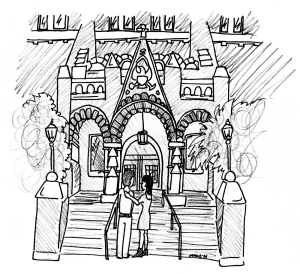
We all have doubts. We doubt our choices, our abilities and our goals. Rational, healthy feelings of doubt can be used constructively to identify and confront any challenge, but there is also the debilitating, paralyzing doubt that can obliterate initiative upon conception, which is the doubt that dominated my life mere months ago that would have made the idea of publishing a piece of my own writing a ridiculous notion. Fortunately, through better understanding of what I was dealing with, the associated treatment and the support of family and friends, I can at least attempt this article.
Prior to my diagnoses of general anxiety disorder and major depressive disorder, I had assumed that “rough patches” were merely something to be endured; seeking counseling was surrender, inferior and weaker to “just dealing with things.” This assumption is common, and I found my fear of self-perception far exceeded my fear of peer perception. We are champions of academia and campus involvement to often unhealthy levels. We hold ourselves to high standards and expect ourselves to be capable of spectacular feats. Confidence is important, but not to the point that it becomes sheer stubbornness.
The situation is improving, but we still face social stigmas surrounding mental health, which mainly arise from a lack of knowledge. However, students of high-performing institutions are also subject to personal expectations and self-ascribed invincibility. I went to Georgetow n’s Counseling and Psychiatric Services only when my depression became so crippling that it directly impaired my ability to function, and that first appointment itself was consumed mostly by professions of self-loathing because of my weakness.
Statistics demonstrate not only the prevalence of mental health diseases on college campuses, but also that this prevalence is much higher among college students than among the general population. Most notably, people ages 18 to 24 who attend college are at twice the risk for suicide than those who don’t. When did college become something we must survive? Weren’t we supposed to be the happier, luckier ones? Wasn’t it supposed to be our coming of age, our opportunity to strike out on our own and pursue our passions? Our chance to impact the world?
A friend restricts himself to classes offering grade security, rather than challenge himself intellectually and risk a lower GPA; a colleague declines study abroad because it could cost leadership positions necessary to his resume; students discuss how many others they must “beat” in a class, reminiscent of “The Hunger Games.” We all face this reality, and while it’s unlikely we can prompt a re-envisioning of all collegiate society, we can address the symptoms of this culture.
Athletes are injured. They are presented with the choice of recognizing the injury or ignoring it, and while opinions regarding the latter choice vary, ignoring it likely prevents an athlete from performing at full capacity; they are not the best they can be for themselves or their teammates.
I benefit from treatment. I can now pursue things in earnest. I can better be the friend I want to be. I can be the best me. I still get sad, I still have doubts, but they are coming into a healthy balance. I’m no longer living day to day, battling the looming specter of irrational terror. Treatment ranges in effectiveness, but we owe it to our fellow Hoyas, if not to ourselves, to pursue relevant education.
In the recent debate on Georgetown’s free speech policy, we’ve been reminded of the importance of student body dialogue and how it yields knowledge and perspective. We discuss politics, philosophy, class and race, yet for mental health, such a fundamentally applicable topic, the conversation remains quiet.
We don’t discuss the floormate experiencing a “rough patch” and struggling to find more reasons to wake up than stay in bed. We don’t hear about the suicide attempts. We don’t hear about the junior prevented from returning to his home on the Hilltop after a medical leave of absence. We hear girls speak of their insecurities about body image, writing them off as shallow or fishing for compliments rather than addressing the disturbing prevalence of eating disorders. We don’t talk about the way things are, and we don’t talk about the way they should be.
To ignore so salient an issue to our campus culture is to fail both in our duty to each other as sources of support and in utilizing our capacity for dialogue and development of understanding. As social beings we must do better; as Hoyas we can and we will.
BEN SAUNDERS is a junior in the School of Foreign Service.



















